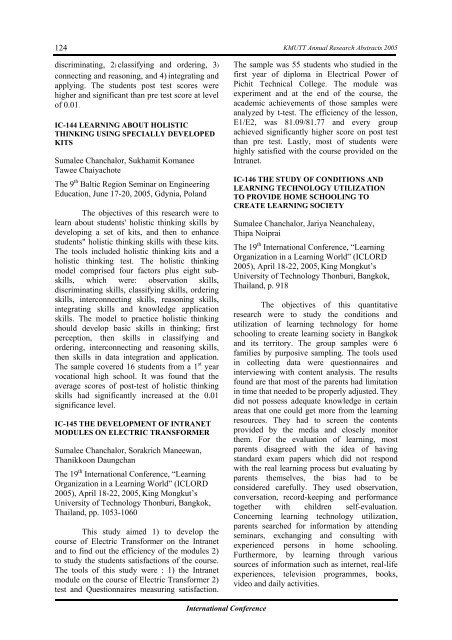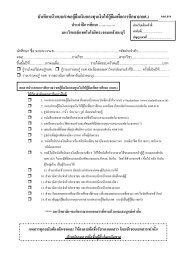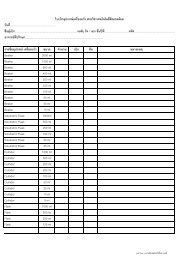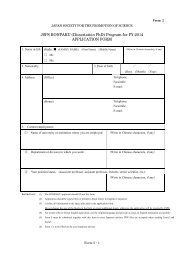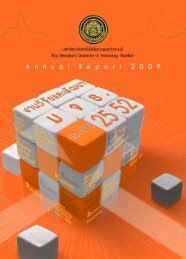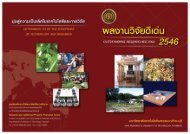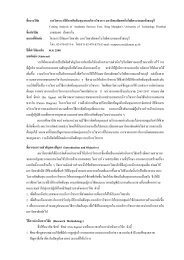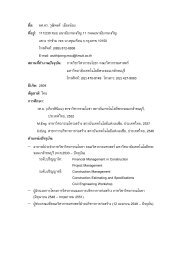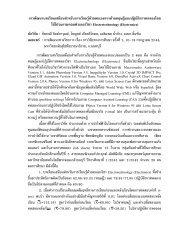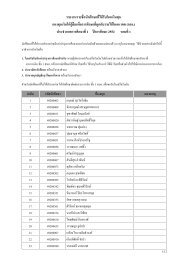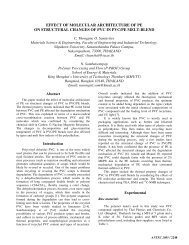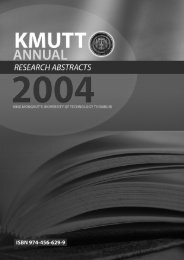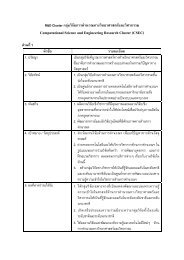Create successful ePaper yourself
Turn your PDF publications into a flip-book with our unique Google optimized e-Paper software.
124<br />
discriminating, 2) classifying and ordering, 3)<br />
connecting and reasoning, and 4) integrating and<br />
applying. The students post test scores were<br />
higher and significant than pre test score at level<br />
of 0.01.<br />
IC-144 LEARNING ABOUT HOLISTIC<br />
THINKING USING SPECIALLY DEVELOPED<br />
KITS<br />
Sumalee Chanchalor, Sukhamit Komanee<br />
Tawee Chaiyachote<br />
The 9 th Baltic Region Seminar on Engineering<br />
Education, June 17-20, 2005, Gdynia, Poland<br />
The objectives of this research were to<br />
learn about students' holistic thinking skills by<br />
developing a set of kits, and then to enhance<br />
students" holistic thinking skills with these kits.<br />
The tools included holistic thinking kits and a<br />
holistic thinking test. The holistic thinking<br />
model comprised four factors plus eight subskills,<br />
which were: observation skills,<br />
discriminating skills, classifying skills, ordering<br />
skills, interconnecting skills, reasoning skills,<br />
integrating skills and knowledge application<br />
skills. The model to practice holistic thinking<br />
should develop basic skills in thinking; first<br />
perception, then skills in classifying and<br />
ordering, interconnecting and reasoning skills,<br />
then skills in data integration and application.<br />
The sample covered 16 students from a 1 st year<br />
vocational high school. It was found that the<br />
average scores of post-test of holistic thinking<br />
skills had significantly increased at the 0.01<br />
significance level.<br />
IC-145 THE DEVELOPMENT OF INTRANET<br />
MODULES ON ELECTRIC TRANSFORMER<br />
Sumalee Chanchalor, Sorakrich Maneewan,<br />
Thanikkoon Daungchan<br />
The 19 th International Conference, “Learning<br />
Organization in a Learning World” (ICLORD<br />
2005), April 18-22, 2005, King Mongkut’s<br />
University of Technology Thonburi, Bangkok,<br />
Thailand, pp. 1053-1060<br />
This study aimed 1) to develop the<br />
course of Electric Transformer on the Intranet<br />
and to find out the efficiency of the modules 2)<br />
to study the students satisfactions of the course.<br />
The tools of this study were : 1) the Intranet<br />
module on the course of Electric Transformer 2)<br />
test and Questionnaires measuring satisfaction.<br />
KMUTT Annual Research Abstracts 2005<br />
The sample was 55 students who studied in the<br />
first year of diploma in Electrical Power of<br />
Pichit Technical College. The module was<br />
experiment and at the end of the course, the<br />
academic achievements of those samples were<br />
analyzed by t-test. The efficiency of the lesson,<br />
E1/E2, was 81.09/81.77 and every group<br />
achieved significantly higher score on post test<br />
than pre test. Lastly, most of students were<br />
highly satisfied with the course provided on the<br />
Intranet.<br />
IC-146 THE STUDY OF CONDITIONS AND<br />
LEARNING TECHNOLOGY UTILIZATION<br />
TO PROVIDE HOME SCHOOLING TO<br />
CREATE LEARNING SOCIETY<br />
Sumalee Chanchalor, Jariya Neanchaleay,<br />
Thipa Noiprai<br />
The 19 th International Conference, “Learning<br />
Organization in a Learning World” (ICLORD<br />
2005), April 18-22, 2005, King Mongkut’s<br />
University of Technology Thonburi, Bangkok,<br />
Thailand, p. 918<br />
The objectives of this quantitative<br />
research were to study the conditions and<br />
utilization of learning technology for home<br />
schooling to create learning society in Bangkok<br />
and its territory. The group samples were 6<br />
families by purposive sampling. The tools used<br />
in collecting data were questionnaires and<br />
interviewing with content analysis. The results<br />
found are that most of the parents had limitation<br />
in time that needed to be properly adjusted. They<br />
did not possess adequate knowledge in certain<br />
areas that one could get more from the learning<br />
resources. They had to screen the contents<br />
provided by the media and closely monitor<br />
them. For the evaluation of learning, most<br />
parents disagreed with the idea of having<br />
standard exam papers which did not respond<br />
with the real learning process but evaluating by<br />
parents themselves, the bias had to be<br />
considered carefully. They used observation,<br />
conversation, record-keeping and performance<br />
together with children self-evaluation.<br />
Concerning learning technology utilization,<br />
parents searched for information by attending<br />
seminars, exchanging and consulting with<br />
experienced persons in home schooling.<br />
Furthermore, by learning through various<br />
sources of information such as internet, real-life<br />
experiences, television programmes, books,<br />
video and daily activities.<br />
International Conference


